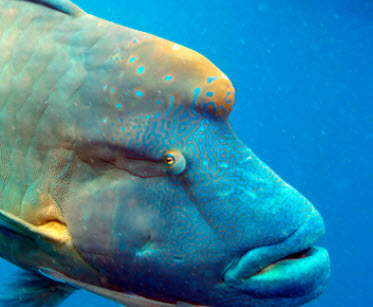Contents
Scuba diving with hard contact lenses
 Generally speaking, scuba diving hard contact lenses is not recommended.
Generally speaking, scuba diving hard contact lenses is not recommended.
- The human eye absorbs nitrogen, and when you descend during a dive nitrogen is slowly released from the eye. Hard lenses do not allow gas to penetrate, and nitrogen can be trapped between the eye and the lens. This is not particularly dangerous, but it can cause blurry vision and this is of course not something one wish to experience during a dive. After all, we use contact lenses to enhance our vision – not decrease it. Also, anything the limits our sight during a dive will make that dive more risky.
- Diving with hard lenses can also make the eyes feel dry and you may have to blink more than usually.
- There is always a risk of contact lenses falling out when the dive mask is flooded. This is true for both hard lenses and soft lenses. However, hard lenses are usually smaller than soft lenses, and using a small lens can increase the risk of it falling out when the mask is flooded.
Scuba diving with soft contact lenses
Soft lenses are better than hard lenses when scuba diving.
- Soft lenses allow gas to penetrate, so there is no build up of nitrogen between the eye and the lens.
- Soft lenses are less likely to cause dry eyes during a dive.
- Soft lenses are usually bigger than hard lenses, and a big lens is less likely to fall out when the mask is flooded. Simply closing your eyes at least slightly when the mask is flooded is usually enough to make a soft lens stay in place.
Inform your diving buddy
Before any dive, you should make sure that your diving buddy knows about your visual impairment and that you are using contact lenses. It is important for the dive buddy to know the extent of your impairment. How well will you see if the lenses fall out? Will it just be a slight inconvenience, or will you be nearly blind?
Once you’re both down in the deep, it will be difficult to use hand signals to explain “I’ve lost my contact lenses and I need your help to handle this situation” unless you have talked about this beforehand.
Also keep in mind that you may lose your dive mask during a dive. It is not usual, but it does happen. If you lose your mask, your dive buddy will be more useful if he or she knows that:
- You want help to find the mask, because losing the mask also meant losing your contact lenses.or
- You want help to find the mask, because you are keeping your eyes closed to avoid losing your contact lenses.
Alternatives
Instead of using contact lenses during scuba diving, you can modify the mask.
If you just need a small correction, there are actually stickers available that you simply stick on the inside of the mask lens to turn it into a pair of corrective glasses for you.
If you scuba dive more than just occasionally, or if you need a bigger correction, you can use corrective lenses that fits a standard mask.
A more expensive option is to get a custom made prescription mask.

